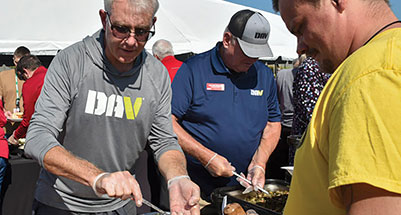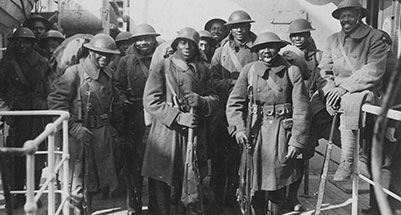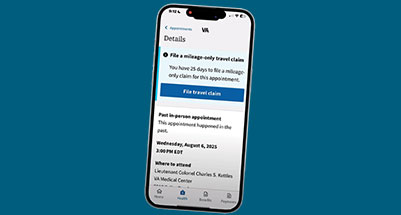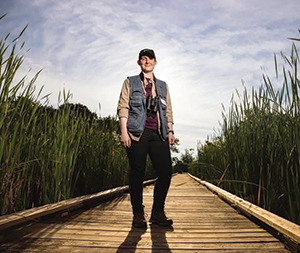
Ellisif “Elli” Cline was an accomplished student-athlete in her small town of Grand Ledge, Michigan. Because of her multiple scholarship offers for academics and soccer, most people expected Cline to head straight to college. She had different plans, though.
With a family history of military service, she joined the Army as a preventive medicine specialist shortly after graduating high school in 2010. Everything looked good to her as her enlistment paperwork was prepared, until she discovered that, under the “don’t ask, don’t tell” policy, she could be kicked out for being gay.
Cline had not yet come out, but she was determined to enlist. So she decided to remain “in the closet.” Life in the Army is challenging for any soldier, but Cline carried the additional weight of hiding her sexual orientation and fearing being outed and discharged from the military.
About 18 months into her service, the Department of Defense repealed don’t ask, don’t tell. But its repeal did little to alleviate her stress.
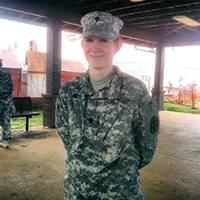
“The change in policy did not make the Army or my unit any more welcoming to me or any other soldiers who are gay,” Cline said. “All it meant was that I could not be discharged from the Army if they found out I was gay.”
Aside from the hostility she says she dealt with, which took a mental toll on her, the physical rigors of Army activities led to a hip injury. Cline went to her medical unit to get it checked out, but—in typical military fashion—the doctors said all she needed was rest and prescribed Motrin for the pain.
“Outside of the physical pain I endured, my mental health depreciated,” Cline explained. “It was frustrating to feel that my injury was diminished by Army medical personnel and, instead of operating to correct the injury, the Army felt it would be easier to medically discharge me.”
After being discharged, Cline returned home to Michigan to enroll in school at Central Michigan University in Mount Pleasant. After her first year in college, she decided to get her hip reevaluated. A local orthopedic surgeon determined that the damage was so extensive that Cline would likely need a hip replacement in the future. In the meantime, the surgeon suggested that he could surgically repair Cline’s hip, which would alleviate some of the pain she had long endured.
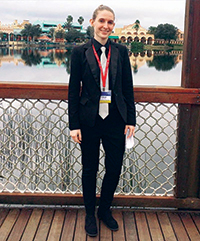
Cline underwent the procedure and started a grueling physical rehabilitation process. She said her path to recovery wasn’t easy, nor was the rest of her transition to civilian life. However, things started to change when she met her school’s student veteran club president. He was welcoming and encouraged her to join the club and become involved on campus.
“Once I discovered the student veterans club, I found my community,” Cline said. “It was nice to meet people with similar experiences and to have friends to hang out with on and off campus. They really helped me start to acclimate to civilian life. This allowed me to focus on school and enabled me to excel.”
Cline eventually began working at the veterans resource center on campus. During her Friday shifts, DAV Department Service Officer Chris Hubbell would come by to assist veterans with their benefits from the Department of Veterans Affairs.
“LGBTQ+ service members who served during [don’t ask, don’t tell] may be reluctant to seek veterans benefits,” said DAV National Service Director Jim Marszalek. “Concealing one’s sexual identity has an isolating effect on them, which can be a barrier to effective outreach. At DAV, we help veterans of all eras, races, religion, gender identity or sexual orientation and strive to create a welcoming environment that makes everyone feel comfortable when seeking assistance for the benefits they have rightfully earned.”
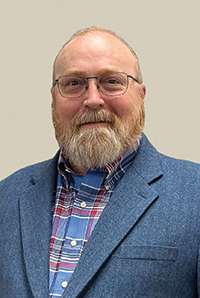
One day, Cline told Hubbell about how the VA gave her a 0% disability rating for her hip injury after she was medically discharged from the Army. Hubbell informed her about his experience of being injured and medically discharged as well. With Hubbell’s experience and expertise in VA benefits, Cline felt comfortable to have him reevaluate her disability claim.
Hubbell helped guide her through the entire process, and within four months, Cline received a disability rating increase that accurately reflected the severity of her injury.
“I am always glad to help veterans get the benefits they have rightfully earned,” Hubbell said. “Helping Elli was really special for me because I got to witness firsthand how much she improved physically during my weekly visits and how she began to thrive in the next phases of her life.”
“For years, I felt invalidated by military doctors saying they wouldn’t treat my hip injury appropriately and refused to operate on it,” Cline said. “Thanks to Chris’s assistance, I not only saw an increase in disability compensation, but I finally felt validation. The support I received from him and DAV has been instrumental in allowing me to pursue my passion in science, education and conservation, and for that I am extremely grateful.”


